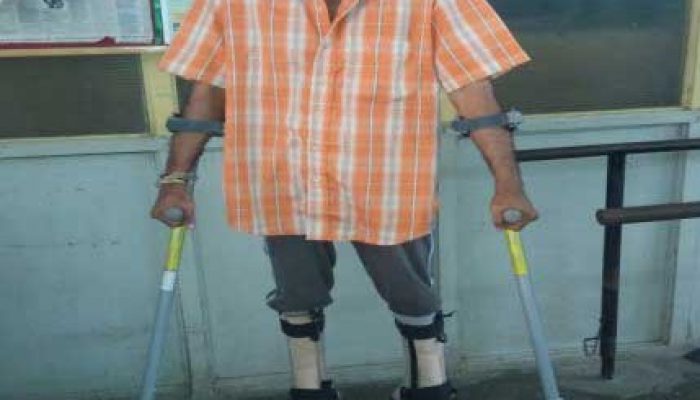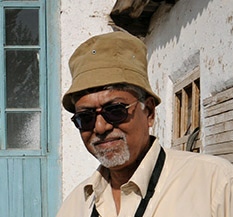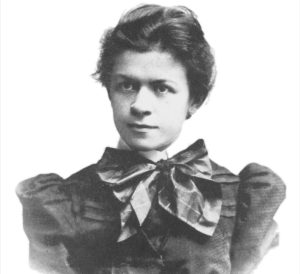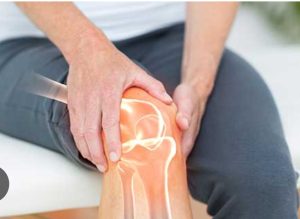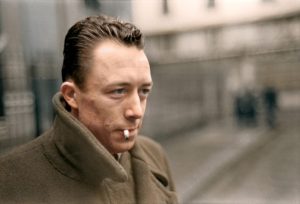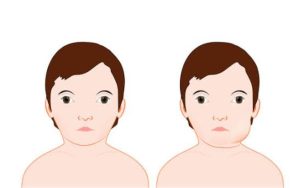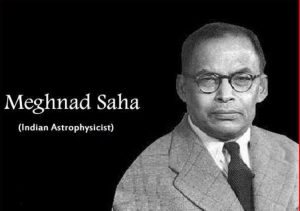It was a rainy day. It had been drizzling from the morning and now there was a heavy downpour forming puddles around our rehabilitation centre. As there were hardly any patients in the outdoor, we, the junior doctors were having a fine time. We have had three cups of tea in a row and I was loitering near the toilet smoking cigarettes, which was strictly prohibited and so added to the pleasure.
Our boss (we alluded to our Head as the boss) was in a particularly bad mood that day. His brightly polished patent leather shoes becoming sodden and muddy on arrival to the hospital presumably triggered his irritation. Our boss is very particular about his dress. A spotless white suite with a bright red or a yellow tie – he calls it a power dress.
The bad mood soared after a small incident. In his chamber boss was examining a patient in his power dress (the listless shoes hidden beneath the table). He was taking his time in auscultation of the heart with his British make stethoscope. (Why the heart was being examined when the patient had only complained of pain in the foot, we never could fathom out; power play, some suggested). When finally boss remarked, “your heart is in very good shape, Sir”, the patient, an elderly gentleman in dhoti and kurta, politely pointed out that the earpieces of the stethoscope were embracing the neck instead of their usual abode in the ear.
Enough cause for a bad mood! He was hoping to let it all out and I was the suitable prey. When he discovered me near the toilet belching out mouthfuls of smoke, he started (in English), on a low pitch commenting on my intelligence and outlook, slowly raising the pitch and including my father and forefathers in his oratory. All concerned being Bengalis, we never could understand his preference for this language in such situations, which very much restricted his vocabulary particularly on the higher pitches.
This was the climate when Bawa made his entry.
From the ambulance he was brought up on a stretcher through the long fight of open stairs with the torrential rain pouring in. Ours was, as we proudly declared, the most inaccessible rehabilitation centre in the whole world. Boss in his menacing mood looked at the prostrate figure of Bawa and took his revenge by ejaculating, “you will be responsible for the rehabilitation of this patient.” Nothing could have been worse for me or for Bawa.
A newcomer to the subject of rehabilitation medicine, I knew very little about managing paraplegia. In any case this was the beginning of my long association with Bawa.
* * * * *
Bawa was a tall strapping man over six feet in height. Both his legs were paralyzed and he had no control of his bowel and bladder. Three months previously he had been beaten up by some villagers, who mistook him for a member of a gang of dacoits. Bawa was convinced that it was a plot by one of his relatives to kill him. In any case the result was a fractured spine with the resultant paralysis.
Bawa continued to visit me regularly over the next two years. Out of habit and possibly due to my lack of confidence in dealing with paraplegia, I preferred listening patiently to all his problems and he obliged by not moving on to some other doctor.
Slowly he improved. His spine was only partially damaged and he was an obstinate man. Bawa was determined to get up and walk and he did. By the end of one year he was walking with two sticks in either hand. It was a slow clumsy gait. It must have been quite painful as the wooden sticks bore into the palms. But nevertheless he walked alone without anybody’s help. His oft-repeated question to me was, whether there was a complete cure of his disease. “Shall I regain my old life, Sir?” he would ask. I tried to be truthful without disheartening him, “you are nearly your old self again, Bawaji. Some problems might remain and you have to live with it.” The answers were never to his satisfaction.
We talked a lot about his bowel and bladder problems. His constipation he managed by manipulating with his fingers. But his major problem was his bladder. He had some control, but leaked at times. Whenever he felt the urge to micturate, he had to rush or his clothes would be soiled. His other problem was sexual, but that is another story.
His wife always accompanied him along with one or two of their four kids. His wife, a frail little woman was dwarfed by his side and all the kids were lively little brats in torn clothes, enjoying their full on their visit to Kolkata.
And then came the day when boss arranged for a clinical meeting where I was to present Bawa’s “case” and discuss the rehabilitation of spinal cord injury. The eminent doctors attending the seminar were not keen on my sociological details of Bawa’s poverty, lack of government facilities, the difficulties he faced in ascending our “heritage” stairs and so on. They were not even impressed by the remarkable recovery made by Bawa, which had astounded me all along. They started brilliant academic discussions on the failure and prospects of regenerating nerves and muscles, which, in presence of Bawa I silently resented.
A happy diversion occurred when a guest faculty from far off Kerala gave a nice little talk. “Medical rehabilitation”, he said, “always starts with a tragic note. A disease or injury cripples and then it is all about struggles and fight backs. A medical rehabilitation professional tries to help restore the lost faculties – physically and mentally. A paralyzed person first learns to sit, and then stand and walk. Rehabilitation doesn’t end there. There are targets to be achieved –he has to go to the market alone; and then may be to his office and so on.” He ended by asking me pleasantly, what Bawa’s vocation was prior to injury.
An embarrassing silence followed. I was shy of uttering the truth and was fumbling for an answer, when Bawa blurted out that he was a vendor. A discussion followed with the unanimous verdict that vending in railway carriages was out of question for someone with paraplegia, whatever the state of recovery and alternative vocational options should be sought out. The day ended with the boss thoroughly disgusted with my performance.
* * * * *
What the doctors never came to know was that, prior to injury Bawa had been a smuggler. His job was to smuggle goods from Nepal across the border and sell them around Kolkata. On his next visit I recollected the discussions of the clinical meeting and asked Bawa what alternative vocations he had in mind. He had none. I suggested he start a shop – a grocery or a pan biri thela, or an STD booth. He rejected all these. There was no scope of such shops near his residence, he said. It was a remote village in Murshidabad in North Bengal
“Well, Bawaji” I said emphatically, “Right or wrong, you can’t go back to smuggling any more. Traveling in train and running around playing hide and seek with the police is out of question. Settle down with something else.” He was non-committal, but said he would think about it.
On his next visit three months later he mumbled, “would you be angry sir, if I gave you a present?” “No”, I said. so I had a gift – a nice looking pen “made in Korea”. I looked up a little startled, “you have started smuggling again Bawaji.” I was vexed. Bawa kept staring at his feet.
“But how do you manage it?” I asked. “Well in the train I take a seat near the toilet”.” And the police?” “Mostly they help me Sir, knowing that I can’t run,” he said. “But why do you do it Bawaji?” I asked. “It must be very difficult. You could have settled down for something else.”
“I could have” replied Bawa. “But you know sir, when I sit by the window of the speeding train, the wind rushes in and strikes my face. Yes. It is then sir, only then, with the air caressing my face, I feel that I have regained my old life”.

